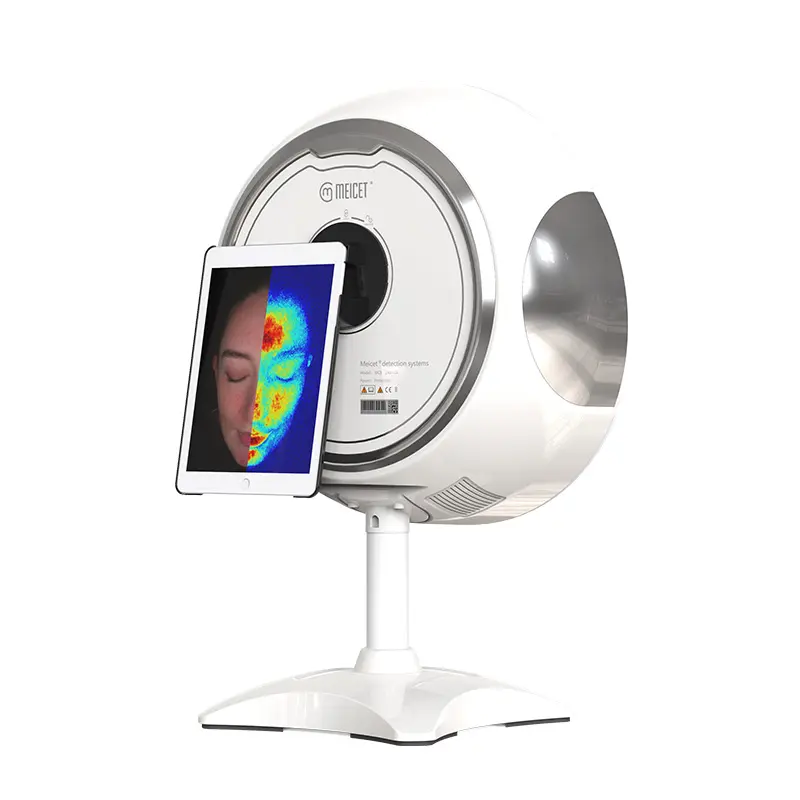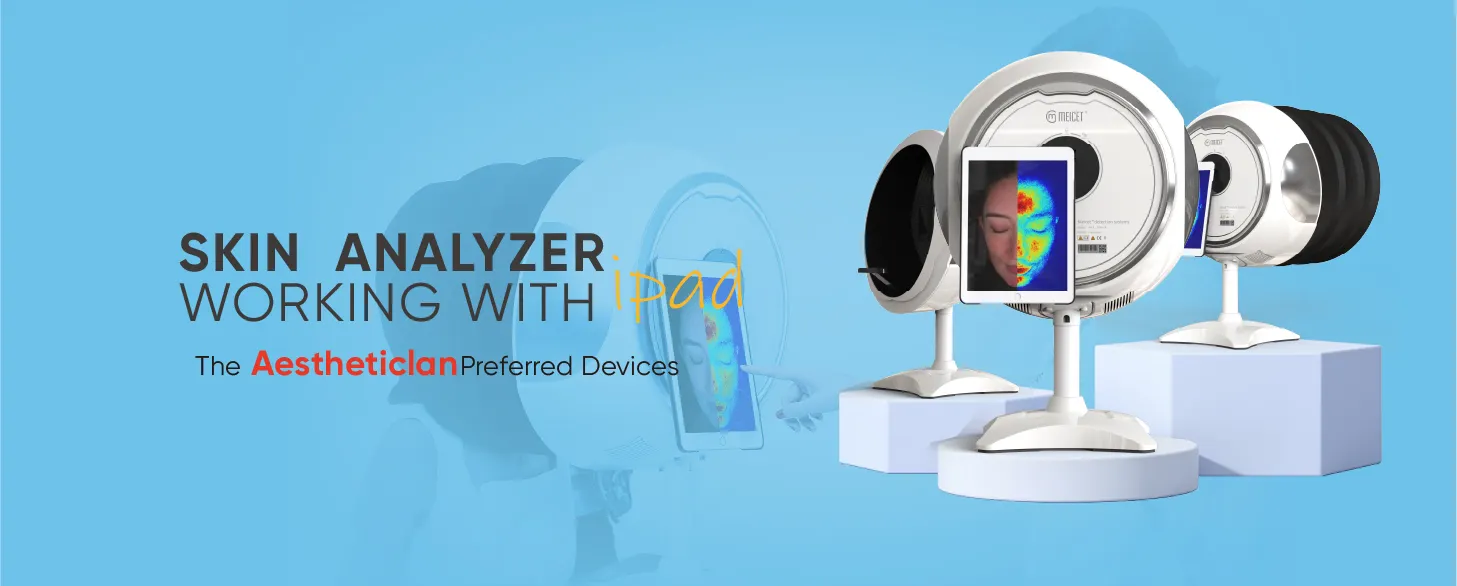
Sensitive skin—characterized by heightened reactivity, barrier fragility, and a tendency toward redness, itching, or stinging—requires consistent monitoring to manage conditions like rosacea, atopic dermatitis, and contact dermatitis. Traditional follow-up models, which rely on in-clinic visits, pose significant challenges: patients in rural or underserved areas face barriers like long travel times, while busy urban patients may delay appointments due to time constraints. These delays can allow mild flares to escalate into severe episodes, increasing discomfort and treatment complexity. MEICET’s MC10 Portable Skin Analyzer addresses this gap by bringing clinical-grade imaging to satellite clinics, community health centers, and even partner salons, ensuring sensitive skin is monitored with precision, wherever care is delivered.

Capturing Sensitive Skin Metrics On-the-Go
The MC10’s compact design and multi-spectral capabilities—including RGB, polarized light, and UV imaging—enable clinicians to capture key sensitive skin metrics in minutes, even in resource-limited settings:
- Polarized light imaging detects vascular dilation, a hallmark of rosacea flares or post-inflammatory redness. In a rural health clinic, a nurse practitioner can use the MC10 to scan a patient with a history of rosacea who reports recent “flushing.” Polarized light scans revealing widespread capillary dilation (vs. transient redness) confirm an impending flare, prompting early intervention with anti-inflammatory topicals—avoiding the need for oral antibiotics.
- UV imaging assesses barrier integrity by visualizing the stratum corneum’s ability to retain moisture. A patient with atopic dermatitis visiting a community pharmacy for refills can have their barrier function checked via UV imaging: irregular, patchy fluorescence indicates ongoing barrier weakness, signaling the need to switch to a more emollient moisturizer. Conversely, uniform UV patterns confirm the current regimen is working, reinforcing adherence.
- RGB imaging tracks texture changes, such as peeling, scaling, or papules, which signal barrier breakdown or active inflammation. For a patient using a new topical steroid for contact dermatitis, RGB scans at a local salon can confirm whether irritation is resolving (smoother texture) or worsening (increased scaling)—guiding dosage adjustments or switching to an alternative medication.
Consider a patient with atopic dermatitis living far from the nearest dermatology clinic. They visit a partner health center regularly for MC10 scans: UV imaging shows improved barrier uniformity over time (confirming their ceramide moisturizer is effective), polarized light reveals no active inflammation, and RGB shows reduced scaling. The data is shared digitally with their dermatologist, who extends their prescription and schedules the next in-clinic visit later—reducing travel burden while ensuring consistent care.
Adapting Treatments with Real-Time Data
Sensitive skin responds quickly to triggers like environmental changes, stress, or product ingredients, making timely adjustments critical to preventing flares. The MC10’s portability enables clinicians to adapt regimens on-site, based on objective data:
- A patient with seasonal sensitive skin visits a satellite clinic in winter, reporting increased dryness. MC10 scans show UV barrier irregularities (consistent with cold weather-induced dryness) and polarized light revealing mild redness (early irritation). The clinician recommends switching to a richer, occlusive moisturizer and adds a soothing serum—preventing progression to a full flare.
- For a patient with contact dermatitis from a new laundry detergent, MC10 scans at a community health center show polarized light redness and UV barrier disruption localized to the neck and chest (areas in contact with clothing). The clinician identifies the detergent as the trigger, recommends a fragrance-free alternative, and schedules a follow-up scan soon after to monitor improvement—avoiding unnecessary steroid use.
- A patient with rosacea preparing for a beach vacation visits a partner salon for a pre-trip scan. Polarized light imaging shows baseline vascular activity, prompting the clinician to prescribe a short-course anti-inflammatory topical to use alongside sunscreen—preventing UV-induced flare-ups during the trip.
This agility ensures small issues are addressed before they escalate. A patient with mild post-laser redness, for example, can have MC10 scans at a local clinic confirming the redness is localized and not spreading—guiding the use of a cooling gel instead of oral medications, which carry greater side effect risks.
Enhancing Long-Term Compliance
Patients with chronic sensitive skin often struggle to maintain long-term regimens, as the benefits (e.g., reduced flares) may feel distant compared to the daily effort of adhering to skincare routines. The MC10’s visual data bridges this gap by making progress tangible:
- A teenager with atopic dermatitis, who resists using their prescribed moisturizer, is shown MC10 scans comparing their skin at diagnosis (patchy UV barrier, polarized redness) to later (uniform UV, reduced redness) after consistent use. The visual proof motivates continued adherence.
- A middle-aged patient with rosacea, skeptical of sunscreen’s benefits, views polarized light scans taken before and after regular use: the post-sunscreen scan shows reduced vascular activity, confirming UV protection’s role in preventing flares.
- A patient with contact dermatitis, who struggles to avoid scented products, sees RGB scans showing how their skin texture improves when using fragrance-free alternatives—reinforcing the link between behavior and skin health.
By transforming abstract “improvement” into visible, shareable images, the MC10 strengthens the patient-clinician partnership—a cornerstone of managing chronic conditions. Patients feel empowered to take ownership of their care, while clinicians gain a tool to reinforce positive behaviors.
The MC10 Portable Skin Analyzer redefines sensitive skin care by making precision monitoring accessible beyond the traditional clinic. Its ability to capture critical metrics on-the-go ensures timely interventions, personalized adjustments, and enhanced compliance—ultimately transforming how clinicians manage sensitive skin across diverse settings, from urban centers to rural communities.
 EN
EN
 AR
AR
 BG
BG
 HR
HR
 CS
CS
 DA
DA
 NL
NL
 FI
FI
 FR
FR
 DE
DE
 EL
EL
 HI
HI
 IT
IT
 JA
JA
 KO
KO
 NO
NO
 PL
PL
 PT
PT
 RO
RO
 RU
RU
 ES
ES
 SV
SV
 TL
TL
 IW
IW
 ID
ID
 SR
SR
 SK
SK
 SL
SL
 UK
UK
 VI
VI
 SQ
SQ
 HU
HU
 TH
TH
 TR
TR
 FA
FA
 AF
AF
 MS
MS
 UR
UR
 BN
BN
 LA
LA

